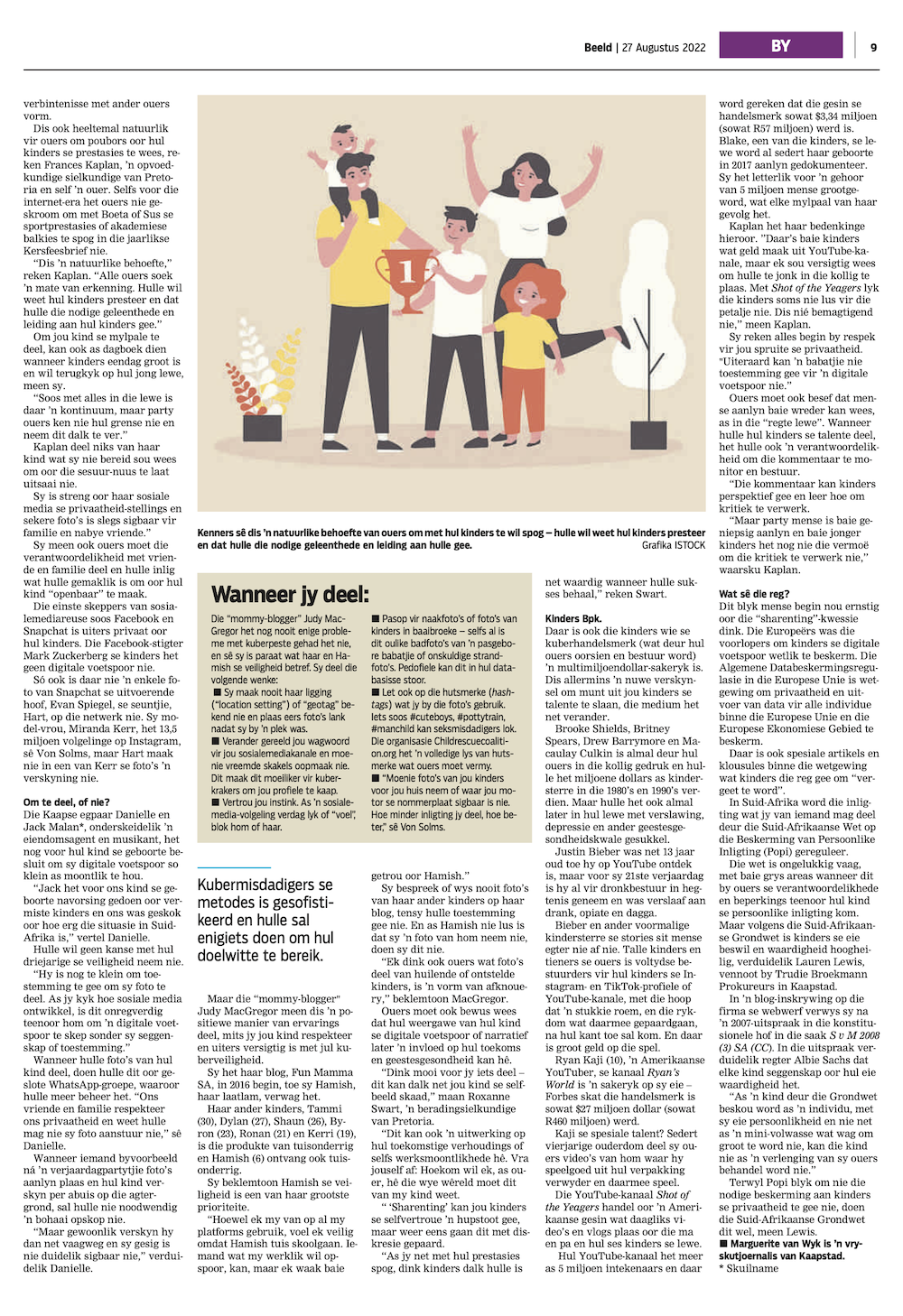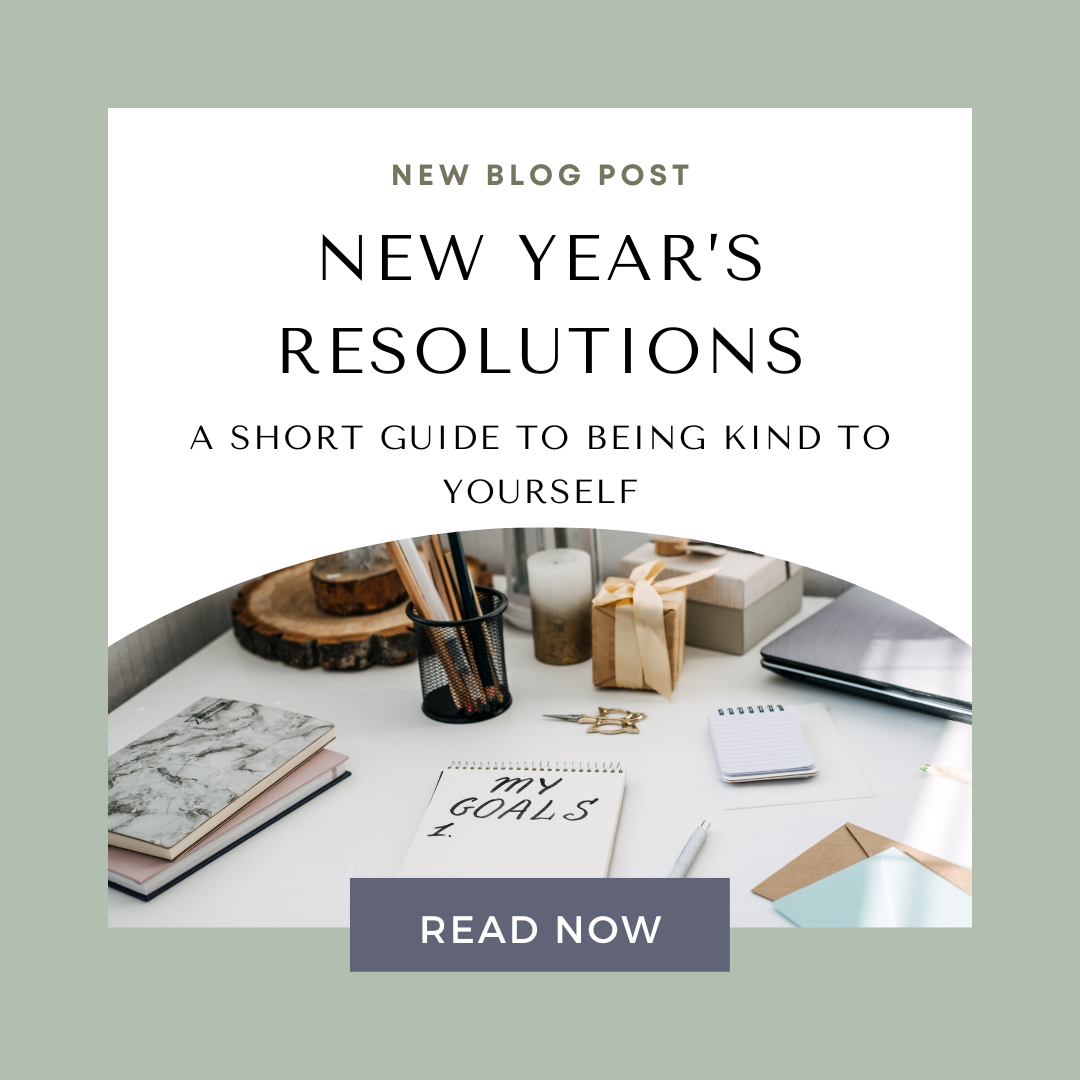The harm of Sharenting - by Roxanne Zwart
When considering parents sharing information and photographs of children, it is important to consider that it can have both positive and negative effects. The negative effects can unintendedly harm their child and includes violating the rights of their child, as well as psychological or emotional harm.
There are different ways which the information can cause harm. Examples of immediate risk or harm may be caused by unintentionally sharing sensitive personal information which could place their child at risk for their physical safety and other implications such as identity theft (sharing sensitive information such as their name, school and address). When sharing information, it is helpful to try and keep safety in mind – are the posts set to a private audience and is there any sensitive information being shared which could potentially cause threat or be harmful?
Other negative effects may include psychological and emotional harm. By sharing embarrassing, inappropriate or very personal information or photographs, parents might run the risk of having a negative impact on the child’s future employment, educational opportunities or even their potential relationships with others and self-esteem. Sometimes, the information shared might also be very difficult or impossible to retract, and this could unfortunately continue to have a lasting negative impact throughout their child’s life.
While most parents do not willingly want to harm or place their child at risk, it might happen unintentionally. Before sharing information or photographs, parents need to think about their own personal reason for sharing and how the information shared might impact their child (now and in future). If the information is sensitive, inappropriate or embarrassing, it is probably best not to share it to minimise the potential harm to their child. Parents can also try and minimise the negative effects or potential harm by keeping audiences limited. Consent is also important.
It is a parent’s responsibility to take care of their child and prevent harm, just as every child has the right to take part in matters that concern their own well-being, bearing in mind their child’s age and maturity level. One way parents can take care of their child and limit harm, and also include the child in matters concerning their own well-being, is to get consent from their children to share information and pictures about them. It is important to also remember that even though a parent does get consent, it remains their responsibility to protect their children from harm (this includes physical, psychological and emotional harm).
Child and adolescent consent:
With regards to consent for children:
Babies, toddlers, and young children cannot consent to information being shared. Therefore, before sharing information, parents’ need to use their own personal judgement and think about their own personal reasons or motivations for sharing the information or photographs – is it in the best interests of their child and what about the potential impact it could have short- and long-term on their life?
With regards to older children, they might not want their information to be shared and get upset if parents do not listen to them or their views. Parents can have age-appropriate talks with their child about how they feel and what their limits are and ask whether they can share something (give consent). Before the age of approximately 7, children are in what is called the pre-operational stage of thinking and this means that they do not have the ability to think of consequences and long-term impacts of decisions, therefore even with a child’s consent, it is ultimately the parents’ responsibility to consider what these consequences and impacts may be.
With regards to consent for adolescents:
During adolescence there is a transition from childhood to adulthood and the child experiences several physical, cognitive, emotional and social changes. Adolescents are at a stage of life where identity is a focus and it is very important to them, as well as the importance of their peer relationships as they develop close friendships and value these relationships. In this stage of life, they may be self-conscious and very concerned about their personal image and own unique identity. Adolescence is also a time where the relationships with their parents’ change as they explore their own identity and independence. Parents can unintentionally have a negative influence on their adolescent’s development by sharing embarrassing information or pictures which they do not want shared on social media or online and which impacts their identity and how they want others to view them. In this way, parents may then unintentionally impact on self-esteem and increase difficulties such as potential bullying and embarrassment. The information shared might also have a negative impact on the adolescents’ peer relationships, even though it may not be intended. Because their adolescent is in this often-difficult stage of life, with many challenges, parents can support their children by respecting their boundaries and limitations – this can often be achieved by having an open discussion and talking to their child about what is okay and what they are comfortable with to share and with who (give consent). This allows the adolescent to feel they have some autonomy and independence in how they want to express themselves or present themselves online.
How to avoid exploiting children
Many parents are proud of their children and want to share their achievements or talents with peers, family and social networks to express their pride, and this may consequently result in recruiters identifying opportunities in these achievements or talents.
If parents are approached by recruiters, it might be a new experience and parents might not know how to proceed. Because it remains the parent’s responsibility to protect their child from harm and to act in the best interests of their child, this could be confusing to navigate and know is right for their child. There are ways parents can act in the best interest of their child which include having discussions with other individuals who have experience in the related field or industry (for example, other parents of children in the industry or industry professionals) and getting as much information as possible to make an informed decision. In deciding this, parents should also consider the demands which might be made on their child, for example, children need development and growth which includes being able to play and engage in age-appropriate activities, and this may be at conflict with the schedule or demands of the recruiters’ expectations. If parents disregard their child’s needs by not providing the opportunity for age-appropriate development and growth, it may result in later emotional or psychological difficulties.
With regards to parents including their child in the decisions of their own well-being, consent is important, and this includes parents having open communication and asking their child what they want and how they feel about it. Children may find many positive effects of exploring and strengthening their own talents and achievements which can be rewarding, and which might also help to foster positive self-concept and confidence. However, the pressure might be too large for children to manage and can have an opposite impact such as low self-esteem, as well as social and emotional difficulties. Parents can help monitor this by being aware of the ways their child is being impacted by being involved with their child and encouraging honest and open communication about their experiences. Children might not always share their difficulties with their parents and parents can help identify whether their child is struggling emotionally or psychologically by being aware of changes with their children, such as with their child’s behaviour, emotions, academics and relationships - increased irritability or anger, social withdrawal, a decrease in marks or suddenly failing, increased anxiety, fear and crying, as well as talks of hurting themselves are some indications that their child might be struggling.
If parents notice these changes they can help and support their child, either by talking to their child or getting outside help. In some instances, it might be necessary to remove their child from situations which are resulting in psychological or emotional harm.
Parents who exploit their children without their child’s consent, or parents who do not address the psychological or emotional difficulties their child is experiencing, place their child at risk for more psychological and emotional harm and which may have a lasting impact and might also be considered abusive. It is the parent’s responsibility to protect their child from harm and act in their child’s best interests.
Self-esteem and social media:
Many parents want to share achievements or proud moments with others which may result in a sense of pride as the parent gains social approval. Sharing these achievements or talents could have both positive and negative impacts on their child’s self-esteem. Self-esteem is shaped by how much a child feels loved, by how much support they get, and the encouragement or criticism from people in their life.
The parent’s pride or the social approval of the child’s accomplishment or talent online might have a positive impact on their confidence and self-esteem. Children may appreciate that their parents are proud of them and want to share, and children might experience this as feeling supported and encouraged, which enhances self-esteem.
However, it could also result in their child developing a sense that their worth is largely tied to social approval and acceptance online as they want to please their parents and do well in order to feel loved. Parents also run a risk of objectifying their child and this may lead to self-esteem or emotional problems later in life if their child associates how much they are loved by needing approval of their achievements or external factors. Social media also might have an impact in how the child interprets support, for example, the more ‘likes’ one receives, the more one is supported, and feelings of support might unintentionally be attached to this criterion and have an impact their child’s self-esteem.
Parents can enhance the self-esteem of their children by having loving relationships (with unconditional love and positive regard), feedback and through encouragement. If parents want to share their child’s achievements or talents after getting their consent, parents’ can help monitor the impact this has on their child though regular communication with their children about how they experience social media.
Children generating money through social media:
With regards to children generating money as an income for their own financial well-being, this may have helpful and positive impacts on the child’s future, however, it is ultimately not a child’s responsibility to generate an income. Parents are responsible for their children’s financial well-being, and it is the child’s right to be financially cared for.
Parents also need to be aware of child labour and the law. Children who are younger than 15 and in the performing arts need a permit from the Department of labour to be employed, otherwise it is considered a criminal offence. Children aged 15 to 18 may not be employed to do work inappropriate for their age or work that place them at risk (according to the Basic Conditions of Employment Act).
Parents need to consider the impact of the activity (or employment) on their child, short-and long-term, and consider the willingness of their child to participate in the activity. Parents can help their children by encouraging open and honest communication, as well as consider the long-term impact and potential risks and rewards on their child.
Fun, empowerment or harm?
Sharing information or images of children can have both negative and positive impacts overall. Before deciding to share, parents can take a moment to really reflect on the personal reason and need to share the information – is it for the parent or the child? Parents need to be aware of their own personal motivation and intention before sharing. Parents also need to consider the potential impact of the information being shared – immediately and in future with regards to the child’s life. Information shared can also empower children and share their talents which could have a positive impact on their confidence and self-esteem, although this may have an opposite impact if the child attaches their self-worth to social approval and external factors. Parental involvement and communication can help children navigate this. Parents are not perfect, and it is an unrealistic expectation to expect perfect parents, but parents who consider the best interests of their child, gain consent and have honest, open communication with their children, allows parents to make decisions which are in the child’s best interests and minimises potential harm.
This post was originally written for Beeld in August 2022

































